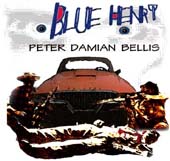|
"We gotta right, Sheriff, to see the body if we want to. How do we know he's really dead if we don't?" "Take my word for it, boys," said the Sheriff. "He's as dead as they come." "Now Sheriff, you know what Farley said." "Farley was drunk," said the Sheriff. "But what about our rights?" "You all don't have any rights," said the Sheriff. "Not when it comes to eyeballing a deceased victim of an at-large criminal intelligence. You all know better than that." "Come on, D. W. Just one look through the back door can't hurt nothing." "Don't push it, boys. You all can see him when they lay him out. Just like anybody else." "God damn it, D. W. How the hell long is that gonna be. They've been working on him for two full days now." "You all just have to wait." From the shade of the porch there was an ominous sounding click, and then silence, and Blue Henry thought it looked like the sheriff was grinning, but he couldn't tell for sure with the glare from the sun, and neither could the dozen rough-and-readies plus five, who as a group had more or less collapsed inward among themselves in a furry of impotent confusion. Then the one who had done most of the talking, an old fellow like the sheriff but with more hair, and a bulbous paunch that lapped over his belt, he began shouting and cursing and then he stepped towards the porch and raised his shotgun and two others filled in behind him and raised theirs as well, and Blue Henry couldn't tell exactly where they were aiming at, and most likely neither could they, because of the glare, maybe they figured D. W. Griggs had lived past his usefulness as Sheriff, or maybe they were aiming at the columns, or even one of the white stone flower pots. Nobody could tell. They raised their shotguns and began firing with simultaneous determination, but the first one, his gun jammed immediately, and the other two had forgotten about ammunition, the same as the five from Laughlin's porch, so all there was was a steady click, click, click, click, and then a couple of under-the-breath curses. Then the one with the jammed gun smacked it against the crumbling red brick walk and tossed it in the grass and left it there, and before anyone said a word he had driven off in a dull green Packard, the dust from his sudden departure settling unevenly on the windows of the other cars. Of course that ended the stand-off at Cooper's Funeral Parlor. The rest of the men sunk into a profound, embarrassed silence, and then slunk off in two's and three's and the sound of car doors clacking shut and then motors puttering off into the steamy, hazy, smothering heat of a late August morning. And then Sheriff D. W. Griggs relaxed his grip on the shotgun he had been holding the whole time and headed from the white of the parlor and the shade of the porch to his own car parked in the grass, and he too drove away. Only Blue Henry remained, for he had brought with him no shotgun or Winchester and so felt no shame at being unable to get past a balding, age-spotted sheriff. He did not know how to feel. He had all but forgotten the need for a funeral suit and the twenty dollars in his pocket. Everything that had happened, from the men on the porch and their talk of shootings and murder and the mob and the squelched raid on the funeral parlor, he had witnessed with a thrilling, shuddering, incredulous excitement, for though he had never heard of such things happening in Pokalawaha, at least not that he could remember, he had always imagined them possible, and as he stood there now in the silence of the others having gone and the glare of the white building before him, all he could think about was Mr. Cavanaugh and how the man was surely dead, an incredible shot, certainly, the gunman hiding in the branches of one of the live oaks on the Dobbs place and then squeezing the trigger, but he was dead just the same, murdered. Then Blue Henry closed his eyes, and he could actually see the thin, dark shadow of a Winchester stretching out before him, the sky becoming a deep, dark, blood-smeared red, and on the road he could see the unaware Mr. Cavanaugh grease-dusting the countryside in a black I-talian two-seater, a convertible, cloth covered seats, also black, the hum of the engine drifting up through the air, the smell of gasoline, of metal, then a crcrcrcraaaackckck, the body stiffening, lurching forward, the automobile lurching forward also, then the body tumbling to the bloodblackening ground, the body broken now, twisted, lying in the ditch, and the automobile also lying in the ditch, also twisted, the wheels spinning, spinning, the air growing heavy with darkness and smoke, and then the wheels not spinning. And this image became for Blue Henry a sort of memory, like pictures on a wall become memories, and so when Blue opened his eyes he wanted to chase down the men who had rushed Sheriff Griggs and tell them that Mr. Thomas Christian Cavanaugh was as dead as they come and he should know because it was he himself, Blue Henry, who had pulled the trigger. |
|
|
|
Copyright ©1995-1997 Circuit Traces Communications. All rights reserved. |

